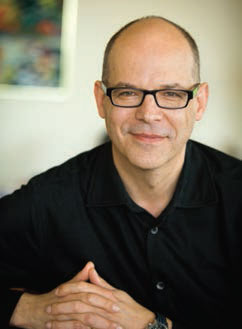Last year about 4,200 international students from 115 countries were pursuing degrees on the Ithaca campus. Many of our faculty, students, and alumni are engaged internationally. Yet, as I suggested in a white paper a few years ago, Cornell must maintain—and in some cases regain—its global edge. I sat down recently with Professor Fredrik Logevall, vice provost for international affairs and director of our Mario Einaudi Center for International Studies, for an update on our efforts.
David Skorton: Fred, you issued a call to action a year ago, as you launched the Internationalization Initiative. Could you describe your achievements in the first year?

Prof. Fredrik Logevall.
Fredrik Logevall: We’re moving vigorously on several fronts. I sense a shared conviction on the part of all of us engaged in this effort that if we are to be a truly top research university worldwide, internationalization must permeate virtually all that we do. It’s not a choice; it’s an imperative. But we’re not starting from scratch. Indeed, I believe we have an advantage because of the range and breadth of what we do, thanks to our long tradition of global research and engagement.
A priority in the first year has been internationalizing the student experience so our students will have the opportunity to have an international component to their curriculum—whatever their college, whatever their course of study. I’m also exploring the creation of a new major in “global affairs,” which could generate a lot of student interest.
Secondly, we’re supporting internationally engaged faculty with enhanced funding for Einaudi Center grants and with a new International Faculty Fellowship program, which I’m hoping will allow Cornell to recruit and retain the best faculty from anywhere in the world. We have four terrific fellows in our first cohort, representing four colleges.
A third priority has been to bring about more coordination, interaction, and discussion across the campus and beyond. Accordingly, we’ve formed an Internationalization Council, made up of senior associate deans from all our schools and colleges, as well as an External Advisory Council, whose members care deeply about the University and have a particular attachment to “Global Cornell”—indeed, whose careers, whose sensibility, are international in every sense.
DS: What roles do study abroad and internationally engaged learning play in helping Cornell graduates function effectively as global citizens?
FL: Study abroad, internationally engaged learning, and what students are doing on campus—all of those things feed in to producing global citizens who can move nimbly in the world and have the capacity for empathetic understanding. It’s about the curriculum, but it’s also about giving students the chance to have a meaningful experience abroad, whether during the academic year, over the summer, or through an internship. It’s about making it possible for them to develop competency in another language. And it’s about having them interact with international faculty and with international students.
DS: Given Cornell’s large international student population, how can we enhance the interaction between international and domestic students for everyone’s benefit?
FL: Globalization is here to stay, and we have a growing number of full-time, degree-seeking international students and also visiting international students. That’s a very valuable thing, and our task is to make sure that our domestic students and international students have opportunities for interaction—inside the classroom and out. You can really do so much to internationalize the student experience right here in Ithaca.
DS: As we begin the sesquicentennial year, with celebrations across the country and internationally, what role do you see for our alumni, including our international alumni, going forward?
FL: I often marvel at the fact that we had students from at least four other countries—England, Canada, Russia, and Brazil—in Cornell’s first class. We’ve always been international, and we continue to be. To think about that in this sesquicentennial year is really exciting. Our alumni—domestic and international—can help us get across the message that Cornell must continue to be engaged with the world, now more than ever. International alumni as well as alumni with international experience can be a tremendous inspiration for our current and future students. They can provide internships and jobs, and help guide us as we think about whether to establish more of a physical presence internationally—whether through “consulates” or offices in selected cities. The External Advisory Council, chaired by Martin Tang ’70, is made up of alumni, many of them based overseas. They are already very important to us and will continue to be.


